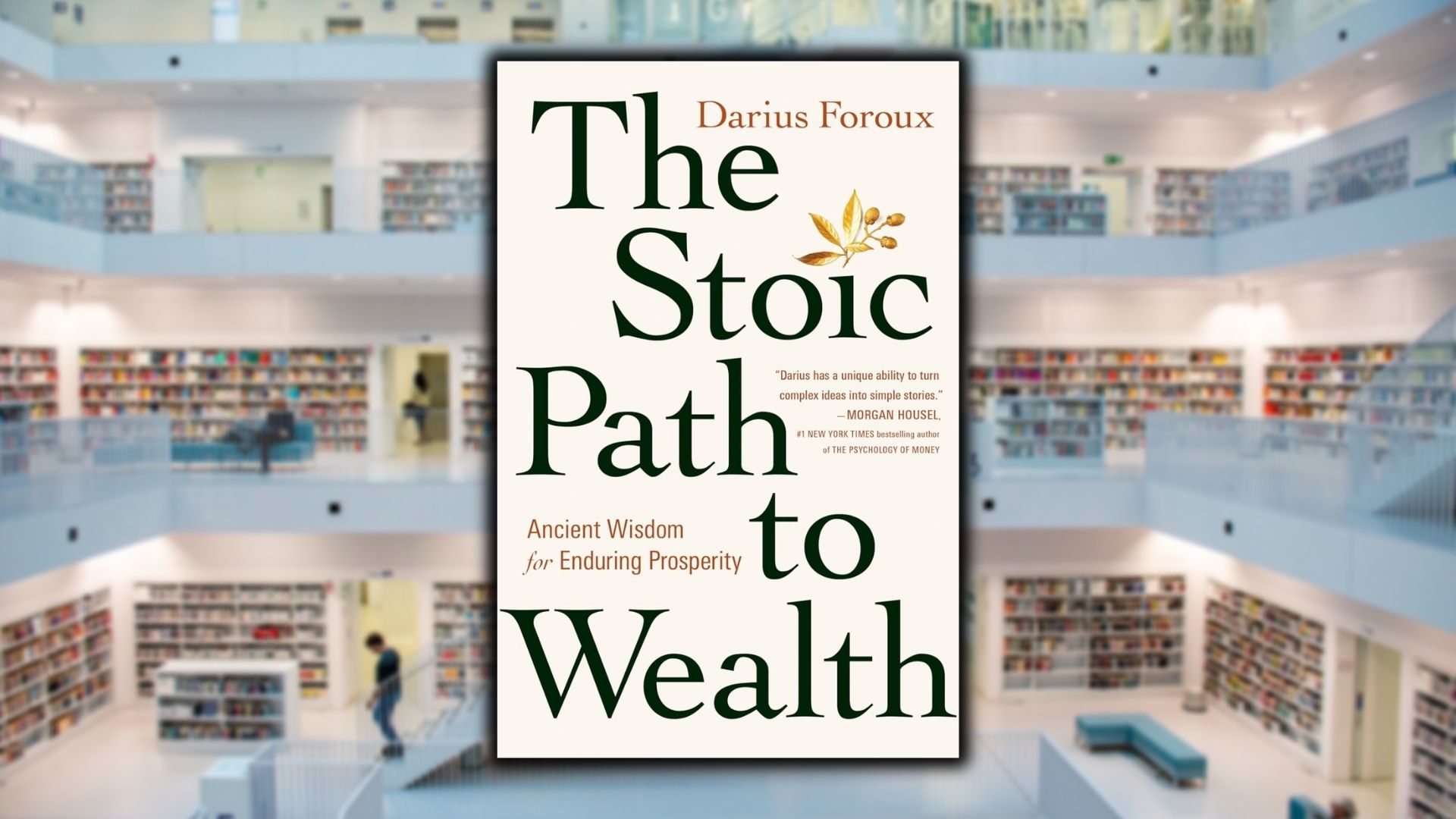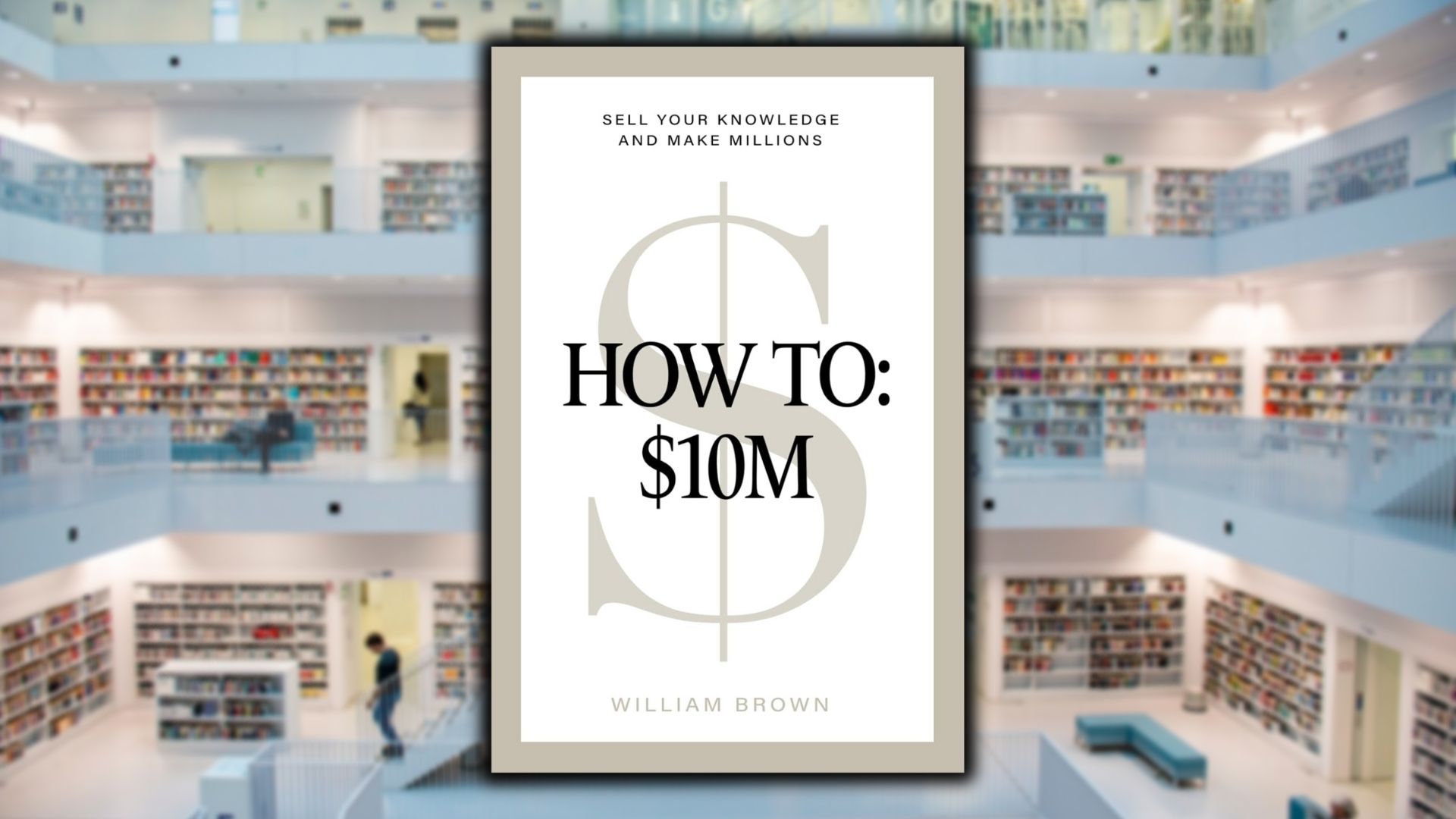Tell me what you think of my new book review format on YouTube!
I’ve been working on just talking in my videos, instead of “presenting” or “delivering,” which does tend to come off as more scripted and less authentic.
You may have even noticed that many of the most popular book content creators (on YouTube and elsewhere) barely use any complicated animations or flashing graphics or anything like that.
It’s a style that’s not only easier to create, but I’m having a lot more fun with it too. Which I hope is obvious in my latest book review!
Tonight’s featured book recommendation is called The Stoic Path to Wealth, by Darius Foroux, which is the same book I cover in my video above.
It’s a great introduction to Stoic philosophy, but it’s less of a comprehensive overview and more of an exploration of how Stoic principles can help you manage your emotions and invest strategically to grow your wealth in the stock market over time.
You’ll find my full summary as well as all of my notes and takeaways below. Or, if you’d prefer, watch my video review.
Now, before our coffees get cold, let’s hit the books!
“Clarity is your savior, and we must prioritize programming, maintaining, and evolving the systems our mind runs on. This is done through self-generated goals, creating a path to achieve them, and focusing on solving the problems that arise without being consumed by distractions.”
“What your subconscious mind believes, leads to what your conscious mind begins taking steps to physically achieve.”
Inside my private business mastermind, Creator Launch Academy, we’re tackling one nonfiction book per month and implementing its lessons inside our businesses.
This month’s book is How To: $10M, by William Brown, a great business book that contains everything you need to know about scaling a coaching and/or e-learning business to more than $10,000,000 in revenue.
Click here to claim your free trial, and join our business book club for educational content creators!


After achieving my (somewhat meaningless) goal of reading 1,000 books before I turned 30, I set a new (also meaningless but cool) goal of reading 10,000 books. As of today, I’ve read exactly 1,424 books, including 70 books so far this year, and if you’re interested, here’s my full Reading List.
“We should prosper financially and mentally. When your finances are solid while your mind is peaceful, that’s true wealth.”
I’ve never seen this before, but this is a book that teaches you how to build wealth in the stock market by utilizing Stoic philosophy. Specifically, the parts of Stoicism that deal with accepting loss, managing your emotions, and rising higher after suffering setbacks. All skills that are incredibly useful in the domain of investing!
The book doesn’t go too far in-depth on Stoic principles - it’s not meant to contain much critical analysis of the philosophy itself. Rather, it’s more about taking this extremely useful, life-affirming philosophy and applying its wisdom to our financial lives.
That being said, for those unfamiliar with Stoicism it’s a solid overview, and I learned plenty about the stock market (especially its history) that I had never heard before. I had read the books of all the philosophers that the author mentioned, but some of the famous investors he profiled I was learning about for the first time, which was fascinating.
Above all, the Stoics realized that if we can control our reactions to external events and manage our emotions, we can learn to thrive in the world, whether that be financially or otherwise.
The same principles the earliest philosophers laid down are still applicable today, and honestly, if you apply them to your investment strategy, you’re likely to build a tremendous amount of wealth over time, instead of losing your proverbial shirt like those poor souls who know nothing of Stoicism.
“The majority of people are focusing on increasing their salaries. While earning more might give you immediate financial relief, it’s not the path to long-term wealth.
Data show that for the 99 percent of taxpayers making less than $500,000, salaries and wages account for 75 percent of their income. For millionaires, their salaries only account for 15 percent to 50 percent of their income.
So here’s what we know about getting rich: invest your money in reliable assets, and let it grow over time. It sounds so easy, and yet it’s one of the hardest things to accomplish in life. Because we don’t just want to get rich at all costs. We want more money, but we also want peace of mind at the same time.
Those two things don’t always go together. You can have so much money you never have to worry about paying the bills, and still be terrorized by anxiety about losing that money.”
“Here’s what Epictetus, one of the most stringent Stoics, said about money: ‘If you can make money remaining honest, trustworthy, and dignified, by all means do it. But you don’t have to make money if you have to compromise your integrity.’
I love this mindset because it doesn’t judge those with ambitions of having money. Want to get rich? Go after it. And if you don’t get rich? No problem. Simply focus on doing the right thing and forget about the outcome.”
“The Stoics were investors. They gave up instant gratification and bad habits to increase their odds of living a peaceful life. That’s exactly the key: to find financial fulfillment is to invest in yourself. You part ways with some of your money today so it compounds and you have more of it in the future.”
“Here’s my proposition: To build long-term wealth in the stock market, you need to invest throughout your lifetime, no matter what’s going on.
To be so consistent that you keep investing in spite of feelings like fear and greed, you need to develop the only edge that’s accessible to all investors: the Stoic Edge.
When you possess that edge, you will have the mental fortitude to stick to your investing strategy, which will make you wealthier over time.”
“The foundation of this book is based on three steps that are backed by Stoicism, namely: (1) Investing in yourself, (2) Accepting loss, and (3) Letting your results compound over time.
I believe this is the first framework for building a Stoic Edge as an investor. Each step ties into the most important aspect of investing and of Stoicism: managing your emotions. This path might not create overnight millionaires. But it does help you to build wealth.”
“Not to assume it’s impossible because you find it hard. But to recognize that if it’s humanly possible, you can do it too.”
“Only the educated are free.”
“When the Stoics talked about freedom, they didn’t talk only about financial freedom. Freedom in a Stoic sense means liberation from ignorance. It means the freedom to live your life peacefully. To not get attached to ideas and beliefs. To not get swayed by external events. And to have tranquility at all times. We can obtain those things by continuously sharpening our minds.”
“No one likes to think about winter during the summer. And during the winter, it seems like summer is never coming.”
“While the stock market behaves rationally over the long term, and it’s driven by the underlying principle of earnings, in the short term, the market behaves highly irrationally, driven by investors’ collective psychology.”
“Ignore the stories - focus on principles.”
“Focus on getting the most out of your time, rather than getting the most out of your money. The potential to earn a few percentage points of returns is often not worth the time.”
“There is no difference between grief for something lost and the fear of losing it.”
“If you accomplish something good with hard work, the labor passes quickly, but the good endures; if you do something shameful in pursuit of pleasure, the pleasure passes quickly, but the shame endures.”
“Consistency is what defines investing success. The type of strategy you use is less important than whether you can stay the course and execute it to perfection.”
Forward this to a friend you think would love this book!
If you were sent this newsletter, click here to subscribe.
To read past editions of The Reading Life, click here.
Click here to recommend The Reading Life on Twitter (X).
OK, that’s it for now…
I’ve got plenty more excellent book recommendations coming your way soon though!
There’s also my YouTube channel, where I publish book reviews, reading updates, and more each week.
And if you want to learn how I’ve built an audience of 170,000+ followers across social media, became a full-time creator, and how I’m rapidly growing my audience and my profits in 2025, join us inside Creator Launch Academy and that’s exactly what I’ll teach you — we’d love to have you in the community!
With that said, I hope you enjoyed this edition of The Reading Life, and enjoy the rest of your day!
Until next time…happy reading!
All the best,
Matt Karamazov
P.S. Whenever you're ready, here are two more ways I can help you:
Creators: Book a 1-1 strategy call with me and I’ll show you how to reach $5K/month in revenue by following a custom plan that we’ll build together.
Join Creator Launch Academy, my private business mastermind for educational content creators who want to stand out in their niche, build multiple revenue streams, and go full-time with their creative passions.














